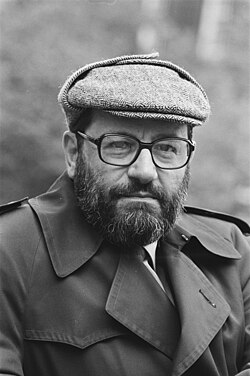Umberto Eco Quote
Oh, what a harmony of abandonment and impulse, of unnatural and yet graceful postures, in that mystical language of limbs miraculously freed from the weight of corporeal matter, marked quantity infused with new substantial form, as if the holy band were struck by an impetuous wind, breath of life, frenzy of delight, rejoicing song of praise miraculously transformed, from the sound that it was, into image.
Umberto Eco
Oh, what a harmony of abandonment and impulse, of unnatural and yet graceful postures, in that mystical language of limbs miraculously freed from the weight of corporeal matter, marked quantity infused with new substantial form, as if the holy band were struck by an impetuous wind, breath of life, frenzy of delight, rejoicing song of praise miraculously transformed, from the sound that it was, into image.
Related Quotes
About Umberto Eco
Umberto Eco (5 January 1932 – 19 February 2016) was an Italian medievalist, philosopher, semiotician, novelist, cultural critic, and political and social commentator. In English, he is best known for his popular 1980 novel The Name of the Rose, a historical mystery combining semiotics in fiction with biblical analysis, medieval studies and literary theory, as well as Foucault's Pendulum, his 1988 novel which touches on similar themes.
Eco wrote prolifically throughout his life, with his output including children's books, translations from French and English, in addition to a twice-monthly newspaper column "La Bustina di Minerva" (Minerva's Matchbook) in the magazine L'Espresso beginning in 1985, with his last column (a critical appraisal of the Romantic paintings of Francesco Hayez) appearing 27 January 2016. At the time of his death, he was an Emeritus professor at the University of Bologna, where he taught for much of his life. In the 21st century, he has continued to gain recognition for his 1995 essay "Ur-Fascism", where Eco lists fourteen general properties he believes comprise fascist ideologies.
Eco wrote prolifically throughout his life, with his output including children's books, translations from French and English, in addition to a twice-monthly newspaper column "La Bustina di Minerva" (Minerva's Matchbook) in the magazine L'Espresso beginning in 1985, with his last column (a critical appraisal of the Romantic paintings of Francesco Hayez) appearing 27 January 2016. At the time of his death, he was an Emeritus professor at the University of Bologna, where he taught for much of his life. In the 21st century, he has continued to gain recognition for his 1995 essay "Ur-Fascism", where Eco lists fourteen general properties he believes comprise fascist ideologies.
